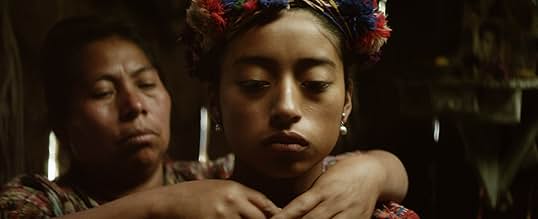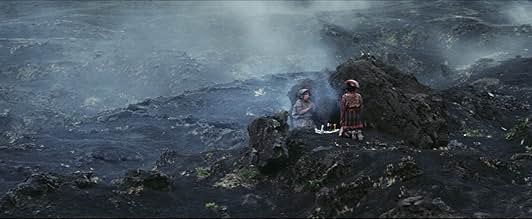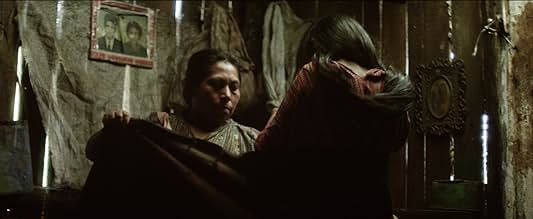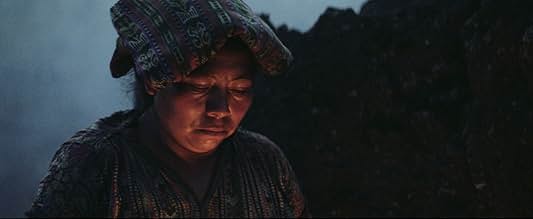IMDb RATING
7.1/10
3.4K
YOUR RATING
On the slopes of an active volcano in Guatemala, a marriage is arranged for seventeen-year-old María by her Kaqchikel parents.On the slopes of an active volcano in Guatemala, a marriage is arranged for seventeen-year-old María by her Kaqchikel parents.On the slopes of an active volcano in Guatemala, a marriage is arranged for seventeen-year-old María by her Kaqchikel parents.
- Awards
- 23 wins & 24 nominations total
- Director
- Writer
- All cast & crew
- Production, box office & more at IMDbPro
Featured reviews
The movie "Ixcanul" tells the story of a young Indigenous girl in Guatemala who confronts a conflict between tradition and change after an unexpected event jeopardizes her future.
Director and writer Jayro Bustamante depicts the traditions of an Indigenous community that relies on coffee harvesting near an active volcano, which they honor as a god.
The movie explores the familiar theme of the clash between the traditions of one generation and the modern values of the younger generation.
The movie's charm comes from the simplicity of this Indigenous community's way of life, where there is no drama, stress, yelling, or parental backlash in response to their daughter's struggles or sudden homelessness. The movie also questions whether a simple, traditional life with enough resources is preferable to chasing "greener pastures" in the North.
In summary, it's a captivating and sincere film that avoids becoming a cheesy tearjerker.
Director and writer Jayro Bustamante depicts the traditions of an Indigenous community that relies on coffee harvesting near an active volcano, which they honor as a god.
The movie explores the familiar theme of the clash between the traditions of one generation and the modern values of the younger generation.
The movie's charm comes from the simplicity of this Indigenous community's way of life, where there is no drama, stress, yelling, or parental backlash in response to their daughter's struggles or sudden homelessness. The movie also questions whether a simple, traditional life with enough resources is preferable to chasing "greener pastures" in the North.
In summary, it's a captivating and sincere film that avoids becoming a cheesy tearjerker.
A beautiful film that very much transports the viewer to the struggles of a girl coming of age and working on a coffee plantation with her parents at the foot of a volcano in Guatemala. The cinematography is gorgeous, the story is heartfelt, and the performances all feel truly authentic. I thank Letterboxd user Muffintree for his suggestion to watch this film, and would recommend it to others as well.
It's clear early on that we're being plunged into a world without the luxury of pretense, where eating pork doesn't mean going in to the air-conditioned market and buying a neatly packaged cut of bloodless pink meat, and living with one's parents doesn't mean being able to pretend they don't have sex, since everyone sleeps in the same room. In this world coffee beans are tediously picked by hand, and workers (who speak indigenous Kaqchikel) are exploited by owners (who also speak the language of the ruling class, Spanish). The owners know that the laborers have few opportunities, and also run a bar where the workers might run up an alcohol tab that erases the earnings they receive from a careful weighing of the beans they've picked. All of this is so that affluent people in far-off lands like America can sip a gourmet brew, made to order by a person with a college degree in English Lit and getting a paltry minimum wage, but I digress.
The daughter (the soulful María Mercedes Coroy) has been betrothed to her father's boss, the foreman of the plantation, a situation that might improve her family's situation. Unfortunately she's more attracted to a field worker who dreams of running away to America to escape the poverty of his life in Guatemala, and drinks to excess maybe to escape it in another way. The way the parents (María Telón and Manuel Manuel Antún) support the daughter is amazing, despite the decisions she makes which have disastrous consequences. The mother-daughter bond is truly special and seems eternal, and I imagined it representing a link which must stretch back generations upon generations into the past. It was also pretty cool to see the father not erupt into anger, instead calmly accepting what happened as if a weather conditions had caused a bad crop one year. Nothing is romanticized here, but the film shows the family bond and perseverance in the face of a hard life, starting with accepting each other.
It's clear early on that we're being plunged into a world without the luxury of pretense, where eating pork doesn't mean going in to the air-conditioned market and buying a neatly packaged cut of bloodless pink meat, and living with one's parents doesn't mean being able to pretend they don't have sex, since everyone sleeps in the same room. In this world coffee beans are tediously picked by hand, and workers (who speak indigenous Kaqchikel) are exploited by owners (who also speak the language of the ruling class, Spanish). The owners know that the laborers have few opportunities, and also run a bar where the workers might run up an alcohol tab that erases the earnings they receive from a careful weighing of the beans they've picked. All of this is so that affluent people in far-off lands like America can sip a gourmet brew, made to order by a person with a college degree in English Lit and getting a paltry minimum wage, but I digress.
The daughter (the soulful María Mercedes Coroy) has been betrothed to her father's boss, the foreman of the plantation, a situation that might improve her family's situation. Unfortunately she's more attracted to a field worker who dreams of running away to America to escape the poverty of his life in Guatemala, and drinks to excess maybe to escape it in another way. The way the parents (María Telón and Manuel Manuel Antún) support the daughter is amazing, despite the decisions she makes which have disastrous consequences. The mother-daughter bond is truly special and seems eternal, and I imagined it representing a link which must stretch back generations upon generations into the past. It was also pretty cool to see the father not erupt into anger, instead calmly accepting what happened as if a weather conditions had caused a bad crop one year. Nothing is romanticized here, but the film shows the family bond and perseverance in the face of a hard life, starting with accepting each other.
Ixcanul is a practically flawless work of naturalistic cinema. Much has been said about the cutural specifics of the film, but not enough about Ixcanul as an argument for the vitality of naturalism, in an era that has been blinkered with frivolous spectacle. The movie treats its audience as adults, never telling them what to think or feel. It's beautifully lit and composed, subtle, thorny and complex. If you can find nothing engaging here, it's hardly the fault of the film.
Often times in Guatemala, you go watch a Guatemalan film solely for the sake of supporting your country. Ixcanul didn't feel that way, it is truly a film that transcends its origins and offers a story that feels universal. The story tackles topics such as agriculture, arranged marriages, pregnancy, among others. The film has a stunning cinematography and direction, which was quite impressive, some scenes do make use of the shaky camera method, which within context of what's happening in the film kind of make sense, however, they may feel a bit "out of place" considering the attention to detail that the rest of the film has.
Although all of the actors are debuting in this film, the acting is stellar, particularly from María Telón who commands the film and really delivers some of it's most powerful and emotionally effective scenes. In some instances, the actors don't need to speak for you to understand their feelings, almost like a silent picture. The Spanish-speaking actors are the only ones that I felt lacking, but their parts are minimal and are hardly detracting to the film.
Overall, Ixcanul is an eye-opener to people who are not familiar with the sad realities that the Kaqchikel people have to go through. It's the first film made in Guatemala that feels thought out, as well as culturally important and significant.
Although all of the actors are debuting in this film, the acting is stellar, particularly from María Telón who commands the film and really delivers some of it's most powerful and emotionally effective scenes. In some instances, the actors don't need to speak for you to understand their feelings, almost like a silent picture. The Spanish-speaking actors are the only ones that I felt lacking, but their parts are minimal and are hardly detracting to the film.
Overall, Ixcanul is an eye-opener to people who are not familiar with the sad realities that the Kaqchikel people have to go through. It's the first film made in Guatemala that feels thought out, as well as culturally important and significant.
I've long been interested in Mayan mythology and culture, so when I heard about a new movie from Guatemala in the Maya language, I knew it was a film I wanted to see. "Ixcanul" is the Maya word for volcano, which looms large in the film, both physically and as a psychological barrier between this village and the rest of the world.
Maria is a teenage girl, beautiful and bold. She lives with her parents, their only child, on a coffee plantation. Her parents have arranged her marriage to the plantation foreman, but neither seem particularly enthused about it. Instead, Maria dreams of escaping to the United States with a local worker. Despite her best attempts to get Pepe's agreement to take her with him North, she never secures a committed response. Her actions, however, have significant repercussions for her and her family.
This could be a film about the uncaring and unsympathetic corporate owners of the plantations, or it could be about the ignorance of peasant life in the Guatemalan villages, or it could be a film that romanticizes North American culture and lifestyle, but it is none of these things. What it is, is an intimate and honest story of a brief moment in time of a family caught on the crossroads of tradition and modernity. "Ixcanul" is Guatemala's first entry in the Academy Awards for Foreign Language Film, and it certainly deserves to win. I am intrigued by the language and have a few unanswered questions, so it is likely I will pick this one up for the collection when released.
Maria is a teenage girl, beautiful and bold. She lives with her parents, their only child, on a coffee plantation. Her parents have arranged her marriage to the plantation foreman, but neither seem particularly enthused about it. Instead, Maria dreams of escaping to the United States with a local worker. Despite her best attempts to get Pepe's agreement to take her with him North, she never secures a committed response. Her actions, however, have significant repercussions for her and her family.
This could be a film about the uncaring and unsympathetic corporate owners of the plantations, or it could be about the ignorance of peasant life in the Guatemalan villages, or it could be a film that romanticizes North American culture and lifestyle, but it is none of these things. What it is, is an intimate and honest story of a brief moment in time of a family caught on the crossroads of tradition and modernity. "Ixcanul" is Guatemala's first entry in the Academy Awards for Foreign Language Film, and it certainly deserves to win. I am intrigued by the language and have a few unanswered questions, so it is likely I will pick this one up for the collection when released.
Did you know
- TriviaThe film was selected as the Guatemalan entry for the Best Foreign Language Film at the 88th Academy Awards but was not nominated.
- SoundtracksMala Mujer
[from the albumLos Mejores Éxitos Bailables Vol. 2. Música de Guatemala"]
Performed by Fidel Funes Y Su Marimba Orquesta
Written by Fidel Funes
Published by Edifosa
Courtesy of Difosa
- How long is Ixcanul?Powered by Alexa
Details
- Release date
- Countries of origin
- Official sites
- Languages
- Also known as
- 火山少女的愛愁
- Filming locations
- Production companies
- See more company credits at IMDbPro
Box office
- Gross US & Canada
- $295,157
- Gross worldwide
- $594,836
- Runtime
- 1h 33m(93 min)
- Color
- Aspect ratio
- 2.35 : 1
Contribute to this page
Suggest an edit or add missing content





















